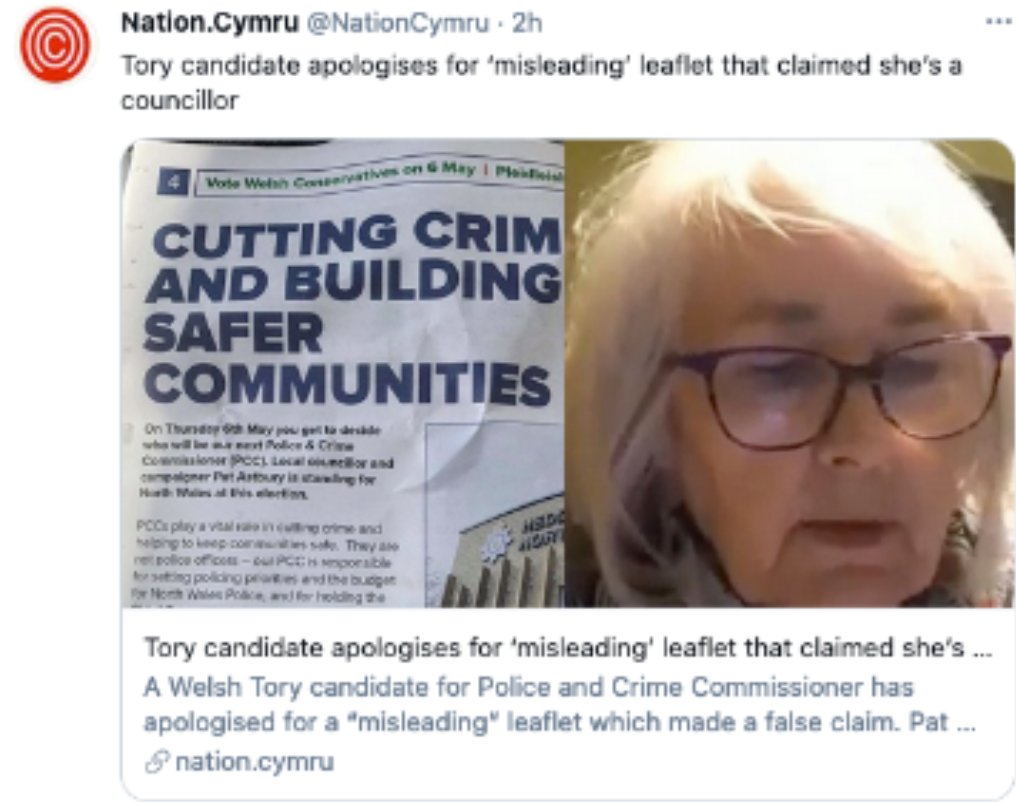This election period has shown more than ever how urgent regulation for electoral ads is. Help us being about change by signing our petition we& #39;ve just started. https://reformpoliticaladvertising.org/take-action/sign-our-petition/
We& #39;ve">https://reformpoliticaladvertising.org/take-acti... added some more examples below (which build on our previous threads of examples). https://abs.twimg.com/emoji/v2/... draggable="false" alt="👇" title="Rückhand Zeigefinger nach unten" aria-label="Emoji: Rückhand Zeigefinger nach unten">
https://abs.twimg.com/emoji/v2/... draggable="false" alt="👇" title="Rückhand Zeigefinger nach unten" aria-label="Emoji: Rückhand Zeigefinger nach unten">
We& #39;ve">https://reformpoliticaladvertising.org/take-acti... added some more examples below (which build on our previous threads of examples).
The above Facebook advertising from ‘Abolish the Welsh Assembly Party’ refers to the nationwide lockdown of ‘non-essential’ retail. The lockdown applied across the UK.
The second para reads: ‘If you vote for Labour, Plaid, or Lib Dems then YOU are responsible for this …& #39;
The second para reads: ‘If you vote for Labour, Plaid, or Lib Dems then YOU are responsible for this …& #39;
(‘this’ being the banning of books by the Welsh
government.)
The issue, though we realise it is probably unnecessary to spell it out, is that the Welsh government have not banned books, or even the sale of them, and voters are not responsible for what didn’t happen, happening.
government.)
The issue, though we realise it is probably unnecessary to spell it out, is that the Welsh government have not banned books, or even the sale of them, and voters are not responsible for what didn’t happen, happening.
News site @NationCymru reported a @Conservatives candidate misleadingly claimed to be a ‘councillor, when in fact a former councillor’ and had previously ‘incorrectly described herself as the PPC in a video on her Facebook page when the election has yet to take place.’
The text in this ad from the @LibDems mayoral candidate reads: ‘Mayor Palmer [ @MayorJPalmer] has LOST £45 MILLION in funding for affordable homes because the government, his own party, doesn’t trust him. This is on top of all the squandered taxpayers’ money, the cronyism
and cover-ups, and the fantasy underground transport system that has cost millions and gone nowhere. It’s time for a clear-out. It’s time for a greener and fairer Cambridgeshire.’
From the perspective of regulation of material claims in advertising, the ad is light on
From the perspective of regulation of material claims in advertising, the ad is light on
substantiation of some very aggressive statements.
There is some substance to the claim regarding the loss in funding of £45million in affordable homes, according to this BBC report https://www.bbc.co.uk/news/uk-england-cambridgeshire-56367435,">https://www.bbc.co.uk/news/uk-e... but the claims of ‘cronyism and cover-ups’, if applied in a
There is some substance to the claim regarding the loss in funding of £45million in affordable homes, according to this BBC report https://www.bbc.co.uk/news/uk-england-cambridgeshire-56367435,">https://www.bbc.co.uk/news/uk-e... but the claims of ‘cronyism and cover-ups’, if applied in a
commercial situation by reference, for example, to the integrity of an opponent, would very likely be subject to reaction from regulators, not to mention the competitor.
Finally a statement found by one of our volunteers on @davidkurten& #39;s London Mayor website reads:
& #39;Unaffordable homes, packed trains, lack of school places, and hospital beds all result from uncontrolled
immigration.& #39;
Claims such as these, unsubstantiated with solid evidence
& #39;Unaffordable homes, packed trains, lack of school places, and hospital beds all result from uncontrolled
immigration.& #39;
Claims such as these, unsubstantiated with solid evidence
and clearly & #39;loose& #39; in their foundations, are a source of irritation to voters, some 9/10 of whom consistently think that ‘it should be a legal requirement that factual claims in political adverts must be accurate,’ according to our YouGov research in 2018, 2019 and 2020.
You can see some other examples are download our full report of the election period from this thread. https://twitter.com/clearpolitic5/status/1389946987882102785?s=20">https://twitter.com/clearpoli...

 Read on Twitter
Read on Twitter " title="This election period has shown more than ever how urgent regulation for electoral ads is. Help us being about change by signing our petition we& #39;ve just started. https://reformpoliticaladvertising.org/take-acti... added some more examples below (which build on our previous threads of examples). https://abs.twimg.com/emoji/v2/... draggable="false" alt="👇" title="Rückhand Zeigefinger nach unten" aria-label="Emoji: Rückhand Zeigefinger nach unten">" class="img-responsive" style="max-width:100%;"/>
" title="This election period has shown more than ever how urgent regulation for electoral ads is. Help us being about change by signing our petition we& #39;ve just started. https://reformpoliticaladvertising.org/take-acti... added some more examples below (which build on our previous threads of examples). https://abs.twimg.com/emoji/v2/... draggable="false" alt="👇" title="Rückhand Zeigefinger nach unten" aria-label="Emoji: Rückhand Zeigefinger nach unten">" class="img-responsive" style="max-width:100%;"/>

![The text in this ad from the @LibDems mayoral candidate reads: ‘Mayor Palmer [ @MayorJPalmer] has LOST £45 MILLION in funding for affordable homes because the government, his own party, doesn’t trust him. This is on top of all the squandered taxpayers’ money, the cronyism The text in this ad from the @LibDems mayoral candidate reads: ‘Mayor Palmer [ @MayorJPalmer] has LOST £45 MILLION in funding for affordable homes because the government, his own party, doesn’t trust him. This is on top of all the squandered taxpayers’ money, the cronyism](https://pbs.twimg.com/media/E02xVoFWUAAzvbL.png)



